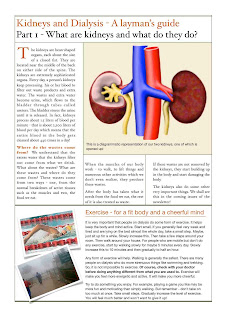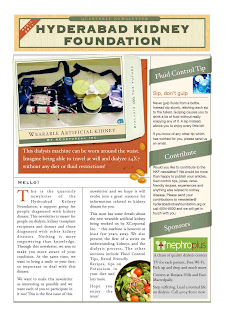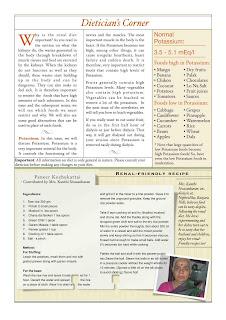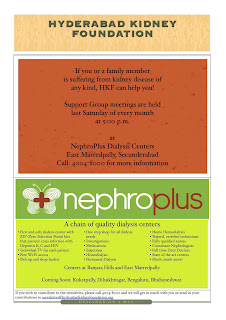Search for dialysis centres here
 Log in to explore the world's most comprehensive database of dialysis centres for free!
Log in to explore the world's most comprehensive database of dialysis centres for free!

Kamal Shah
Hello, I'm Kamal from Hyderabad, India. I have been on dialysis for the last 13 years, six of them on PD, the rest on hemo. I have been on daily nocturnal home hemodialysis for the last four and half years. I can do pretty much everything myself. I love to travel and do short weekend trips or longer trips to places which have dialysis centers. Goa in India is a personal favorite. It is a great holiday destination and has two very good dialysis centers.
E-mail: This e-mail address is being protected from spambots. You need JavaScript enabled to view it
The criminal act of not educating patients
I happened to meet a young guy, on dialysis for a couple of months now. I introduced myself to him and chatted about his background and history with renal disease. I then asked him about a transplant. He said he was not told by his doctor about that option but had heard about it and was exploring it.
I wonder why he wasn't told about that option? Was any education given to him at all about his options? Was PD mentioned? Or was he simply condemned to a life of hemodialysis??
Who will educate patients if it is not for the doctors? Every patient does not have access to the internet. Even those who do may not be proactive enough or feel the necessity to look this up.
A simple talk about the different options doesn't take too long. Is that too much to ask? Tell me, someone please!
... http://www.kamaldshah.com/2011/04/criminal-act-of-not-educating-patients.html
Grim truths that nobody wants to talk about
I met someone today. I'll call him Vishnu. He has been on dialysis for the last seven years. Like most other people, he has spent a fortune on his disease (a few lakhs). His parents died a few years back. He has a brother and a sister. Both don't feel the need to look after him.
Vishnu gets dialysis under the government's Aarogyasri scheme. He was all praise for the quality of dialysis offered at the Aarogyasri unit run by BBraun at Secunderabad's Gandhi Hospital. He said he used to get a lot of chills at other hospitals where he paid and got dialysis but after shifting to Gandhi Hospital, he has not had that problem. All patients get very good quality dialysis, the full four hours.
Vishnu now stays at a private Old Age home even though he is only 40 years old. There he is able to get the salt restricted diet he needs. He pays around Rs. 3,000 per month including food. He is now running out of money as he is unable to work. His Hemoglobin is 6 (a dialysis patient's should be between 11 and 12.5). He used to get Erythropoietin from the Aarogyasri unit. However, it has stopped for the past few weeks. He does not get iron injections, something necessary to get his blood counts up. He used to work as an accountant at an office but had to discontinue due to his health.
Vishnu wonders why he has to pay the full fee for the bus pass when he travels to the dialysis unit when patients having other ailments get a huge discount. Ditto for blood from the Red Cross. Thalassemia patients apparently get blood at highly subsidized rates from the Red Cross. Why can't the Red Cross provide blood at the same rates to hemodialysis patients? Medicines are another pain point. Aarogyasri does not cover the medicines a dialysis patient has to take. They have to buy these medicines from pharmacies and these can be very expensive.
There is absolutely no doubt that the govenrment's Aarogyasri scheme is a revolutionary scheme and that such a scheme exists in today's India mired in corruption scandals of increasing shamelessness is a miracle. Yes, the poor can now get dialysis. But, how will they get to the center? Yes, the government is doing an excellent job in providing dialysis and preventing thousands from dying. Please also do something about their other basic needs. This will not be a huge burden for sure. But it will help people lead lives that bear some semblance to normalcy.
... http://www.kamaldshah.com/2011/04/grim-truths-that-nobody-wants-to-talk.html
Hyderabad Kidney Foundation launches newsletter

... http://www.kamaldshah.com/2011/04/hyderabad-kidney-foundation-launches.html
Disposing off leftover food
The problem is when there is just a little left. Say, a couple of mouthfuls. What do you do about this?
I found my mother would usually convince us to finish it off or if all of us refused, she would eat it herself. She felt that the hassle of transferring that small quantity to the fridge in a vessel and then storing it there for a whole night simply outweighed the benefits! Many a time she would finish the remaining food even though she was quite full!
I used to criticize my mother asking her why she did not throw that portion? I asked her whether she preferred dumping the food in her stomach rather than the trash?! When she was full, it was always better to throw it rather than eat it, I argued.
Cut to the present.
I am home alone these days. I run into similar situations quite often. The food being cooked is for one person. Very often there is a little bit of food left. I have a few choices - put the remaining food in the fridge, throw it or eat it. Putting it in the fridge seems too much of a hassle. Throwing it - well, honestly, I cannot bring myself to throw the food. I don't know what it is. I just cannot do it. So, most of the time, I end up - well, eating it!
... http://www.kamaldshah.com/2011/04/disposing-off-leftover-food.html
The state of diagnostics in India
... http://www.kamaldshah.com/2011/04/state-of-diagnostics-in-india.html
 Professional dialysis recruitment
Professional dialysis recruitment



